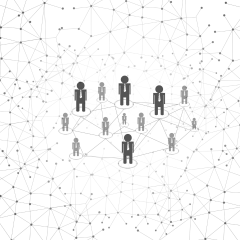You are here
- Home
- Blogs
- Anonymous's blog
- Adaptive and dynamic organisations: systems thinking as leadership
Adaptive and dynamic organisations: systems thinking as leadership
This is part of an occasional blog series of ‘thought pieces’ written by Dr Helen Britton, Visiting Fellow to The Open University.
The second thought piece examines the potential for a more systems thinking approach to leadership..

Recently I attended a meeting where the guest speaker presented a fascinating and thought-provoking presentation on systems thinking. Anyone who knows me knows that I enjoy a good puzzle from time to time. Hence, anything that encourages me to examine and analyse how things are connected immediately gets my full attention, especially if it is related to a real problem.
The question is, why and how is this relevant to leadership?
Systems leadership comprises of three interconnected elements: the individual, the community and the system. It is a set of skills and capacities that any individual in an organisation can use to enable and support a process of change.
Of course, how an organisation is structured defines which positions have power, how decisions are made and who makes them. Knowledge of components in these processes and how they interact or not is at the centre of any sustainable business innovation in any sector. Yet the mere mention of 'systems' often conjures up cogs, wheels, and circuits for some and the human system for others. Whichever metaphor you choose, the fundamental idea is that you must understand the interactions between parts to grasp the whole fully.
Systems Thinking is a management discipline that examines the different interactions within a ‘system’. It is underpinned by the work of the biologist Ludwig von Bertalanffy who developed a general systems theory movement in the 1920s, the aim of which was the meaningful integration of all knowledge. Over the following decades, post Second World War, these ideas developed from the biological sciences to other scientific disciplines and the social sciences. The concept of 'system' was central to this thinking.
Fundamentally, a ‘system’ is a whole constituted of two or more interconnected parts that will influence the whole's behaviour. How these ‘parts’ affect the whole will depend on what the other ‘parts’ are doing.
In taking this metaphor further, then Systems Thinking can be viewed as a practical approach to understanding how an organisation works and how processes can help to meet its goals and values. Examining how different complex component ‘parts’ within an organisation (a system) influence and interact with each other and with other (external systems) may influence the decisions and actions that impact the entire organisation and its partners. These are living ‘open systems’ that continually exchange ‘materials’ with each other. They are multidisciplinary: education, medicine, environmental, and political; crisscrossing sectors in a weave of increasing complexity.
The Systems Thinking approach to leadership, whilst still being in an early stage of its conceptual development, is particularly well-suited to areas of multidisciplinary stakeholder alliances. When you think about the variety of entrepreneurial, innovative activities that occur within and between organisations, it comprises a myriad of human and physical capacities. They interact within and across both physical and virtual places; a particular environment is a complex interrelated 'system' of places.
One of my colleagues in the voluntary sector set up a successful social enterprise some years ago that has developed over the past two years in ways she said she had never envisaged:
“To me, leadership is a task, not a role. I take a holistic, wide-angled lens approach. I examine the whole and the relationships rather than splitting them into parts per se. I see where the individuals are with the skills-sets needed to initiate, develop and maintain an idea. As an idea grows, so do the coordinating stakeholder teams with the collective vision and responsibility. This is the only way we could have delivered food parcels, medicines, test packs; you name it, we've delivered it during the pandemic. We all check how the different elements of our delivery interact and communicate with each other; not just me.”
Many practitioners deal with a bewildering array of problems and an overwhelming amount of complexity, often with a reduced workforce. However, what is very uplifting is to be involved in coordinated actions by people holding very different ideas and viewpoints. Often these collaborations involve representation from civil society organisations, research institutions, local government, businesses and others. By combining their capacities aimed at shared goals, these initiatives are supported and driven by individuals who are the catalysts for action. They empower others to ‘get involved’.
With our experiences working in and with voluntary organisations, many of us know the potential of collaborative partnerships, with a keenly focused common purpose and the momentum for change. There are numerous examples of outstanding, sustainable initiatives both pre and mid-pandemic. Many of these initiatives would never have gotten off the ground without multi-stakeholder coalitions.
In 2017, The World Economic Forum placed systems leadership as a central construct of its institutional strategy to serve as a leadership-level, multi-stakeholder platform.
As organisations examine what they want their futures to look like, a closer examination of the transformative potential of systems thinking requires closer scrutiny. We all recognise that organisations' interactions and networks can often achieve something remarkable.

Dr Helen Britton
Helen is an educational practitioner, researcher and entrepreneur. After starting her professional life in the chemical industry, she re-trained to teach mathematics and to develop her entrepreneurial interests in construction and property restoration. She has lectured in mathematics and Access to Science and Technology. Helen has almost three decades of experience of designing and delivering innovative and inclusive courses and capital projects as part of multi-stakeholder initiatives within the United Kingdom.
13th September 2022
